It was while researching the role of the asthmatic Lynch that Ross first became acutely aware of the plight of children with severe asthma. 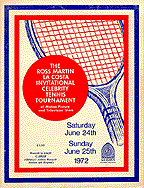 It's no surprise that without hesitation he took up their cause, choosing as beneficiary the Children's Asthma Research Institute and Hospital (CARIH), one of the country's leaders in this area. In 1967 he became CARIH's National Chairman for the Theatre Arts, a lifetime appointment that Ross took very seriously. He made hundreds of appearances to raise both funds and public awareness on behalf of organization over the years. In 1972 as a CARIH fund-raiser, he and his wife, Olavee, essentially invented the high-profile celebrity tennis tournaments for charities we see annually. The Ross Martin Celebrity Tennis Tournaments at La Costa took place each June until a prior commitment forced the Martins to pass the sponsorship to others, but by that time the event was well-entrenched in both the tennis and charity circuits and sponsorship to date is still a highly-sought position.
It's no surprise that without hesitation he took up their cause, choosing as beneficiary the Children's Asthma Research Institute and Hospital (CARIH), one of the country's leaders in this area. In 1967 he became CARIH's National Chairman for the Theatre Arts, a lifetime appointment that Ross took very seriously. He made hundreds of appearances to raise both funds and public awareness on behalf of organization over the years. In 1972 as a CARIH fund-raiser, he and his wife, Olavee, essentially invented the high-profile celebrity tennis tournaments for charities we see annually. The Ross Martin Celebrity Tennis Tournaments at La Costa took place each June until a prior commitment forced the Martins to pass the sponsorship to others, but by that time the event was well-entrenched in both the tennis and charity circuits and sponsorship to date is still a highly-sought position.
By 1963, CBS had Ross on contract and major plans to use the versatile actor. Ross appeared in several series pilots for the network while continuing to rack up guest appearance after appearance in major network series (Bonanza, Dr. Kildare, Twilight Zone, Wagon Train, etc.) with more emphasis on drama than in the previous decade. He also completed three major feature films and was riding the impending success of Edwards' Great Race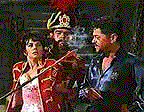 when CBS came to him with a series idea for a 'Bond'ian spy spoof in the old west. Although the character of 'James West' had not yet been cast, Ross Martin was the first and only choice of the network for the other lead - the 1870s undercover Secret Service agent 'Artemus Gordon', master of disguise and impersonation. Although Ross turned them down until the project was more fully conceived, CBS kept making offers because they couldn't envision anyone else for such a demanding, complex role. After Ross signed and Robert Conrad was inked to play the other lead, The Wild, Wild West went on-air September 17, 1965 with a tour de force of gadgets, disguises, deadly dames, maniacal villains and fancy fisticuffs, and television was never the same.
when CBS came to him with a series idea for a 'Bond'ian spy spoof in the old west. Although the character of 'James West' had not yet been cast, Ross Martin was the first and only choice of the network for the other lead - the 1870s undercover Secret Service agent 'Artemus Gordon', master of disguise and impersonation. Although Ross turned them down until the project was more fully conceived, CBS kept making offers because they couldn't envision anyone else for such a demanding, complex role. After Ross signed and Robert Conrad was inked to play the other lead, The Wild, Wild West went on-air September 17, 1965 with a tour de force of gadgets, disguises, deadly dames, maniacal villains and fancy fisticuffs, and television was never the same.
To say that working on West was wild would be an understatement. 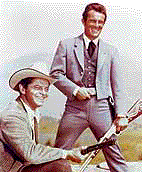 The show had a grueling schedule for both stars and a reputation for being as tough as the two Secret Service agents it featured. Over one hundred and four episodes, Ross donned disguises and created more than one hundred and twenty different characters, each with its own unique appearance, accent and mannerisms. On visiting the set and observing Ross ply his craft, one sage television critic exclaimed "Ross Martin is a damned Alec Guinness in chaps!" No one dared argue, for indeed the gifted actor was essentially a one-man repertory company and Ross was soon duly nominated for an Emmy.
The show had a grueling schedule for both stars and a reputation for being as tough as the two Secret Service agents it featured. Over one hundred and four episodes, Ross donned disguises and created more than one hundred and twenty different characters, each with its own unique appearance, accent and mannerisms. On visiting the set and observing Ross ply his craft, one sage television critic exclaimed "Ross Martin is a damned Alec Guinness in chaps!" No one dared argue, for indeed the gifted actor was essentially a one-man repertory company and Ross was soon duly nominated for an Emmy.
The severe expenditure of energy definitely wasn't one-sided. Robert Conrad was himself heavily involved in choreographing fights and did most of his own stunts, and both stars were often on the set for eighteen hours a day or more. Somehow in the middle of it all, Ross managed to continue his hobbies of painting, photography, and cabinet-making, and most importantly met, courted, and married his soul mate, Olavee.
The Herculean efforts of both West cast and crew paid off in popularity as Wild, Wild West won its Friday night time slot all four years it was on the air. Thirty plus years later, the unique series is once again airing nationally with a legion of fans from around the world and a feature film based on the concept in production.
The energy dumped into West was not without its price, however. 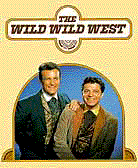 Conrad and most of the stunt men were injured at one time or another, Conrad seriously enough to cancel the last two episodes of the season. Ross broke his leg when a prop malfunctioned and due to the hectic shooting schedule had to re-block all his scenes in three full episodes on the fly to accommodate the cast. Then the unthinkable happened. Ross was stricken by a severe heart attack and was not expected to survive. With the support of his wife and family he made a miraculous recovery and returned to the series after missing only ten weeks of production. Wild, Wild West ended its fourth season in late 1969 with both stars back and healthy and the show still drawing a hefty thirty-three share. As cast and crew prepared for season five, CBS suddenly canceled the program -- the victim of an anti-violence crusade in Congress. Ross and the rest of the production was given only one day notice.
Conrad and most of the stunt men were injured at one time or another, Conrad seriously enough to cancel the last two episodes of the season. Ross broke his leg when a prop malfunctioned and due to the hectic shooting schedule had to re-block all his scenes in three full episodes on the fly to accommodate the cast. Then the unthinkable happened. Ross was stricken by a severe heart attack and was not expected to survive. With the support of his wife and family he made a miraculous recovery and returned to the series after missing only ten weeks of production. Wild, Wild West ended its fourth season in late 1969 with both stars back and healthy and the show still drawing a hefty thirty-three share. As cast and crew prepared for season five, CBS suddenly canceled the program -- the victim of an anti-violence crusade in Congress. Ross and the rest of the production was given only one day notice.
The 1970s opened with the hard-working actor reading scripts and examining his options in all respects. Career-wise, both the artistic and time constraints of another series were not something he wanted and the networks were taking a wait-and-see attitude with respect to Ross's health anyway. Temporarily dispelling that worry, Ross had taken up tennis not long after his marriage and now he took the sport to heart, playing hard and fast whenever possible no matter the temperature. The application of the theatrical craft itself, for itself (rather than prestige or a paycheck) had always been an integral component of Ross's raison d'etre and now he made the conscious decision to make this his career priority. Personally, the threat of another heart attack could not be ignored or taken lightly, and time with those he loved became the most important gift of all. With his family at his side, Ross made a major re-evaluation of life and career.
Into the mix went all these considerations and what emerged was a far more relaxed man. Family first, then a balanced mix of philanthropic work and career. And with the latter, he would simply have fun. He returned to the theatre and musicals which were the best place to ply the craft for the craft's sake, and with over thirty years of experience behind him, audiences were treated to masterful performance after performance with his critically-acclaimed portrayal of John Adams in 1776 (1976-7) earning a special place in the public's heart.
what emerged was a far more relaxed man. Family first, then a balanced mix of philanthropic work and career. And with the latter, he would simply have fun. He returned to the theatre and musicals which were the best place to ply the craft for the craft's sake, and with over thirty years of experience behind him, audiences were treated to masterful performance after performance with his critically-acclaimed portrayal of John Adams in 1776 (1976-7) earning a special place in the public's heart.
Features meant a large amount of time away from his family and he rarely took them on. An exception was Abdullah (1975), shot largely in Iran. The film had a strong script and Ross was made a very good offer, which he accepted. Unfortunately, the political climate in Iran suddenly took a severe turn, and anything American was targeted. Abdullah was never completed. The film's production schedule also compromised the preparation of the popular Ross Martin Celebrity Tennis Tournament series that year and in the interest of quality Ross and Olavee canceled the event. In hindsight, the Iranian feature contradicted the priorities Ross and his family had chosen, and he avoided similar commitments thereafter.
Ross's decades of experience naturally led to work behind both camera and stage. For longtime friend Lucille Ball, Ross directed a large number of episodes of both Here's Lucy and The Lucy Show along with a number of episodes from other series and network pilots. For the stage he directed Moliere's A Doctor in Spite of Himself and single-handedly produced, scored, and conducted Wincelberg's The Windows of Heaven. Ross's talent for characterization put him in high demand as a television guest star, and he accepted roles in Columbo, Night Gallery, Barnaby Jones, and Hawaii Five-0, plus dozens of made-for television features and specials including two successful Wild, Wild West reunion movies. He returned to radio, doing specials for the armed services and starring in the rare dramas of the era such as The CBS Radio Mystery Theatre. All through the seventies and early eighties his talent for dialects kept him extremely busy doing voice-over work and animation. Looking at the amount of work he completed, anyone who didn't know Ross Martin had changed his priorities with respect to his career would have never been able to guess.
In July, 1981 Ross's heart condition sadly proved fatal and at the age of sixty-one, 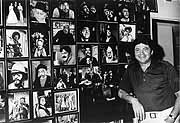 one of Hollywood's most respected figures was gone. He left behind almost 800 appearances in television and film, and more than 1500 in radio for us to watch, listen to, and admire, and from which to learn. A number of his character performances are archived at and used by University of Southern California's School of Cinema-Television students in their media education. His series still run on national television today. His dialect ability is the standard by which Hollywood trains its future thespians, and current stars such as Dana Carvey name him as a major career influence.
one of Hollywood's most respected figures was gone. He left behind almost 800 appearances in television and film, and more than 1500 in radio for us to watch, listen to, and admire, and from which to learn. A number of his character performances are archived at and used by University of Southern California's School of Cinema-Television students in their media education. His series still run on national television today. His dialect ability is the standard by which Hollywood trains its future thespians, and current stars such as Dana Carvey name him as a major career influence.
Ross Martin's humanitarianism, extensive contribution as a television pioneer, and strength of character both in real life and his chosen roles remain with us today, embodied in the very fibre of any medium in which he performed.

 It's no surprise that without hesitation he took up their cause, choosing as beneficiary the Children's Asthma Research Institute and Hospital (CARIH), one of the country's leaders in this area. In 1967 he became CARIH's National Chairman for the Theatre Arts, a lifetime appointment that Ross took very seriously. He made hundreds of appearances to raise both funds and public awareness on behalf of organization over the years. In 1972 as a CARIH fund-raiser, he and his wife, Olavee, essentially invented the high-profile celebrity tennis tournaments for charities we see annually. The Ross Martin Celebrity Tennis Tournaments at La Costa took place each June until a prior commitment forced the Martins to pass the sponsorship to others, but by that time the event was well-entrenched in both the tennis and charity circuits and sponsorship to date is still a highly-sought position.
It's no surprise that without hesitation he took up their cause, choosing as beneficiary the Children's Asthma Research Institute and Hospital (CARIH), one of the country's leaders in this area. In 1967 he became CARIH's National Chairman for the Theatre Arts, a lifetime appointment that Ross took very seriously. He made hundreds of appearances to raise both funds and public awareness on behalf of organization over the years. In 1972 as a CARIH fund-raiser, he and his wife, Olavee, essentially invented the high-profile celebrity tennis tournaments for charities we see annually. The Ross Martin Celebrity Tennis Tournaments at La Costa took place each June until a prior commitment forced the Martins to pass the sponsorship to others, but by that time the event was well-entrenched in both the tennis and charity circuits and sponsorship to date is still a highly-sought position.
 when CBS came to him with a series idea for a 'Bond'ian spy spoof in the old west. Although the character of 'James West' had not yet been cast, Ross Martin was the first and only choice of the network for the other lead - the 1870s undercover Secret Service agent 'Artemus Gordon', master of disguise and impersonation. Although Ross turned them down until the project was more fully conceived, CBS kept making offers because they couldn't envision anyone else for such a demanding, complex role. After Ross signed and Robert Conrad was inked to play the other lead, The Wild, Wild West went on-air September 17, 1965 with a tour de force of gadgets, disguises, deadly dames, maniacal villains and fancy fisticuffs, and television was never the same.
when CBS came to him with a series idea for a 'Bond'ian spy spoof in the old west. Although the character of 'James West' had not yet been cast, Ross Martin was the first and only choice of the network for the other lead - the 1870s undercover Secret Service agent 'Artemus Gordon', master of disguise and impersonation. Although Ross turned them down until the project was more fully conceived, CBS kept making offers because they couldn't envision anyone else for such a demanding, complex role. After Ross signed and Robert Conrad was inked to play the other lead, The Wild, Wild West went on-air September 17, 1965 with a tour de force of gadgets, disguises, deadly dames, maniacal villains and fancy fisticuffs, and television was never the same.
 The show had a grueling schedule for both stars and a reputation for being as tough as the two Secret Service agents it featured. Over one hundred and four episodes, Ross donned disguises and created more than one hundred and twenty different characters, each with its own unique appearance, accent and mannerisms. On visiting the set and observing Ross ply his craft, one sage television critic exclaimed "Ross Martin is a damned Alec Guinness in chaps!" No one dared argue, for indeed the gifted actor was essentially a one-man repertory company and Ross was soon duly nominated for an Emmy.
The show had a grueling schedule for both stars and a reputation for being as tough as the two Secret Service agents it featured. Over one hundred and four episodes, Ross donned disguises and created more than one hundred and twenty different characters, each with its own unique appearance, accent and mannerisms. On visiting the set and observing Ross ply his craft, one sage television critic exclaimed "Ross Martin is a damned Alec Guinness in chaps!" No one dared argue, for indeed the gifted actor was essentially a one-man repertory company and Ross was soon duly nominated for an Emmy.
 Conrad and most of the stunt men were injured at one time or another, Conrad seriously enough to cancel the last two episodes of the season. Ross broke his leg when a prop malfunctioned and due to the hectic shooting schedule had to re-block all his scenes in three full episodes on the fly to accommodate the cast. Then the unthinkable happened. Ross was stricken by a severe heart attack and was not expected to survive. With the support of his wife and family he made a miraculous recovery and returned to the series after missing only ten weeks of production. Wild, Wild West ended its fourth season in late 1969 with both stars back and healthy and the show still drawing a hefty thirty-three share. As cast and crew prepared for season five, CBS suddenly canceled the program -- the victim of an anti-violence crusade in Congress. Ross and the rest of the production was given only one day notice.
Conrad and most of the stunt men were injured at one time or another, Conrad seriously enough to cancel the last two episodes of the season. Ross broke his leg when a prop malfunctioned and due to the hectic shooting schedule had to re-block all his scenes in three full episodes on the fly to accommodate the cast. Then the unthinkable happened. Ross was stricken by a severe heart attack and was not expected to survive. With the support of his wife and family he made a miraculous recovery and returned to the series after missing only ten weeks of production. Wild, Wild West ended its fourth season in late 1969 with both stars back and healthy and the show still drawing a hefty thirty-three share. As cast and crew prepared for season five, CBS suddenly canceled the program -- the victim of an anti-violence crusade in Congress. Ross and the rest of the production was given only one day notice.
 what emerged was a far more relaxed man. Family first, then a balanced mix of philanthropic work and career. And with the latter, he would simply have fun. He returned to the theatre and musicals which were the best place to ply the craft for the craft's sake, and with over thirty years of experience behind him, audiences were treated to masterful performance after performance with his critically-acclaimed portrayal of John Adams in 1776 (1976-7) earning a special place in the public's heart.
what emerged was a far more relaxed man. Family first, then a balanced mix of philanthropic work and career. And with the latter, he would simply have fun. He returned to the theatre and musicals which were the best place to ply the craft for the craft's sake, and with over thirty years of experience behind him, audiences were treated to masterful performance after performance with his critically-acclaimed portrayal of John Adams in 1776 (1976-7) earning a special place in the public's heart.
 one of Hollywood's most respected figures was gone. He left behind almost 800 appearances in television and film, and more than 1500 in radio for us to watch, listen to, and admire, and from which to learn. A number of his character performances are archived at and used by University of Southern California's School of Cinema-Television students in their media education. His series still run on national television today. His dialect ability is the standard by which Hollywood trains its future thespians, and current stars such as Dana Carvey name him as a major career influence.
one of Hollywood's most respected figures was gone. He left behind almost 800 appearances in television and film, and more than 1500 in radio for us to watch, listen to, and admire, and from which to learn. A number of his character performances are archived at and used by University of Southern California's School of Cinema-Television students in their media education. His series still run on national television today. His dialect ability is the standard by which Hollywood trains its future thespians, and current stars such as Dana Carvey name him as a major career influence.